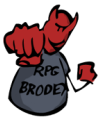DarkArcher
Educated
- Joined
- Mar 3, 2015
- Messages
- 64
So, if there is concern about TTON shouldn't questions also come into play about what this means for Bard's Tale IV? Just sayin...



Wasteland 2 is better than both by far, only D:OS is on the same level.Wasteland 2 was worse than PoE and Shadowrun combined, and I hate Shadowrun.
Wasteland 2 is ugly, the combat is repetitive and unimaginative, the story is poorly tought out shit, alot of the areas are huge but full of boring fights and with pratically no decent content in them, the hyped reactivity was just hype but it's still better than PoE so I kinda agree with you.Wasteland 2 is better than both by far, only D:OS is on the same level.

Blablablablablablablablabla I kinda agree with you.

Nobody really seems to give a damn about BT4. Campaign was all sorts of terrible and failed to generate any hype.
I think I'll completely forget that I backed it / its existence and will be surprised when I'll get a memo that it has been released.
Also, I still have Wasteland 2 collecting dust on my hard disk. I've been one click away for sometime, but caught myself
replaying the old Syndicate from Bullfrog instead, or perusing Let's plays on the Codex. Ah, well.
I'll stay slightly optimistic for TTON, as long as inXile doesn't pull an 'Consoles are teh Future'.






















The thing about Fargo in Interplay is that it was a big publisher, not a small or medium-sized developer looking for something to stay afloat. He filed for the IPO, cancelled several projects, switched focus to consoles, and we all know the result.
Most of Shiny's games were released on PC as well, and Messiah and Sacrifice bombed as PC exclusives. As for the cause and effect: Fargo wanted the entire company to switch focus to consoles, including Black Isle. It did happen eventually, but Fargo wanted to do it sooner, and that's one of the reasons he left.I think you're doing some reversing of cause and effect there.
BTW, Interplay's console studio, Shiny Entertainment, actually made some pretty decent games. Shame they didn't sell.
Just a minor rant on a topic I've always wanted to write about.




Most of Shiny's games were released on PC as well, and Messiah and Sacrifice bombed as PC exclusives. As for the cause and effect: Fargo wanted the entire company to switch focus to consoles, including Black Isle. It did happen eventually, but Fargo wanted to do it sooner, and that's one of the reasons he left.
On the whole, the reason Interplay crumbled was because of poor management, but if one wants to know the points where bad calls made, I'd say those are the most important ones. Still, it was the oldest tale in the industry: a few successful games are released, leadership gets too excited, hire too many people, don't keep enough cash - they have to pay the massive influx of people they're hiring, after all - and when things go to shit the company is not healthy enough to turn things around.
I mean, they had Interplay Films for several years and not a single film was made. Digital Mayhem burned money for five years and the dev team changed so much people probably lost count.
It almost happened to Obsidian, for example, and it could happen to them again.Just look at Sawyer's recent interview. They went from a low (pre-KS) of 75 to 200 employees now, and according to Feargus it costs $1 million a month to pay the bills. They almost tripled in size in 3 years, and people wonder why the vast majority of RPG studios will never be as successful as BioWare or Bethesda, and why Bethesda was the only studio with the cash to buy Fallout when Interplay went to shit.
But I digress. Just a minor rant on a topic I've always wanted to write about. Maybe one day I'll write a wall of text nobody will read.
If you say so. Interplay's history is well documented, same for the failures of smaller RPG devs, otherwise no one would've called for a CRPG renaissance a couple of years ago.You always wanted to write about a topic that you know nothing about?

Thanks.Good post.
If you say so. Interplay's history is well documented.















But I really don't see any evidence that Interplay's management was preoccupied with "consoles" before Herve took over. To wit, they cancelled Colin McComb's Planescape action-RPG for the Playstation, but let PS:T live.
I'm not sure now, but IIRC the only reason the french took over was because they needed cash and Fargo sold part of their own shares and Titus ended up with a majority.



The whole console vs. PC hostility is something coined up in late 2000s

Origin got the EA subsidiary treatment. It was doing alright before that. NWC relied on Might & Magic and was also acquired. Once M&M became less successful, the company suffered as a result, and 3DO was in bad shape too. It happens. They could've diversified their projects, but that's easier said than done, and it wasn't their call alone. SSI was the same. As for Sir-Tech I don't know the details, so I can't say. They were making good games till the very end.There's no doubt that Interplay was mismanaged in the 1990s. Just like Origin, New World Computing, Sir-Tech Software, and SSI. They all fucked up. It was a bad time and holding a grudge against Fargo for it seems pointless.
But I really don't see any evidence that Interplay's management was preoccupied with "consoles" before Herve took over. To wit, they cancelled Colin McComb's Planescape action-RPG for the Playstation, but let PS:T live.
Like many companies, Interplay kept little cash on hand, and relied on credit agreements and revenue from game sales to operate. With fewer titles shipping, and problems with their credit agreements, Interplay had to find sources of cash and ways to cut costs.
Interplay Entertainment Corp, by its own admission, has been teetering dangerously close to the brink of bankruptcy, and was only recently pulled from the precipice when Infogrames Inc. agreed to purchase Interplay subsidiary Shiny Entertainment for approximately $47 million.
Interplay's bank line of credit (their borrowing program) relied on a $2 million guarantee from Fargo. The lender used $1 million of Fargo's cash to repay that program. Fargo also made a $3 million loan to the company in April 2001 that was due in May 2002. Interplay was also owed $2.5 million by a business controlled by Fargo. That was written off as a loss.
During its five year run, the team went through two executive producers, three producers, three lead programmers and two lead artists. They started out with the idea of a Resident Evil in space, but this was changed abruptly by upper management from survival horror to an action game. The aliens were weakened and made more numerous. In the end the game was scrapped by management again and restarted ten months before the release date. Thus, the game's actual programming was done in the space of ten months even though the game was in development for five years, which is one of the reasons that the story and characters seem fleshed out whereas the game play seems rushed and incomplete.







